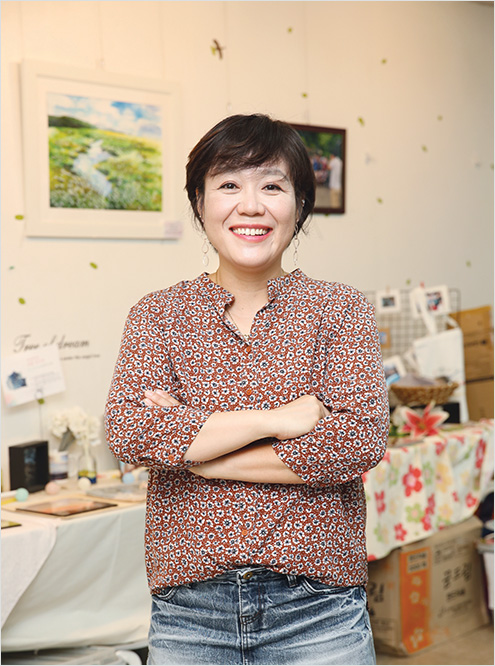People on the spot
Kim Eongyeong, representative of ‘Ariari’, community of the mentally disabled
2021.12.16
Ariari, a community in Sanggwan-myeon, Wanju-gun, is a gathering where the mentally ill and the activists who help them meet. We are engaged in various cultural activities to improve the community's perception of the mentally ill and to raise the self-esteem of the mentally ill. Kim Eongyeong, a psychiatric nurse, leads the meeting.
Q. First of all, would you introduce yourself?
A. I am a member of staff at ‘Hansarang,’ a rehabilitation facility for the mentally ill. I have worked as a nurse at a psychiatric hospital for ten years, and have been working here since 2015. The hospital that I used to work at was for people with severe symptoms. However, as I saw patients repeatedly coming back to the hospital, I wondered how to help them adapt well in their community. So I moved to this rehabilitation facility. It's hard because it consumes much more physical strength and mental energy than before, but it's more rewarding.
Q. How was the community ‘Ariari’ formed?
A. Actually, I never had any intention to do it. In 2018, I happened to participate in the Culture Makers Academy of the Wanju Cultural City Support Center. It was a lecture to find solutions to problems in the local community through culture. There were various problems due to the prejudice of residents against the mentally ill in the facility where I worked. I just wanted to find out what I could do to make both the local community and the mentally ill communicate with each other, and to improve residents' perception of the mentally ill. Then, I came to a community through Made in Public, a community support project of the Wanju Cultural City Support Center. At first, the name was Iris, but later it was changed to Ariari. In 2019, it was officially registered as a non-profit organization.
Q. Were the prejudices or misunderstandings by local residents about the mentally ill so severe?
A. Residents near the facility showed us a lot of hatred. They didn’t like the mentally ill walking around their village, so they filed civil complaints to the town office and the police station, demanding that the mentally ill not walk around the village, and to make matters worse, they frequently requested that the facility should be removed from their neighborhood. That's actually more of a "hate" than prejudice. Sometimes when criminal cases involving mentally ill people were reported on TV, it got worse. So I thought it’s urgent to improve the perception of the mentally ill. I really wanted to let them know ‘The mentally ill are the same people as you are. They do not hurt anyone.’

Q. How many members of ‘Ariari’ are there, and what activities have you done?
A. About 30 in total, most of whom are the mentally ill and the others are three or four activists working at the facility, including me. With the support of the Wanju Cultural City Support Center for community activities, we participated in some hands-on experience programs like taking pictures, and natural dyeing. We took pictures of our daily lives and local landscapes of the neighborhood and held a photo exhibition. We were very happy and little by little, the local residents started to respond. At first, we took pictures with mobile phone cameras, but these days, our photo-taking skills have improved enough to take pictures with film cameras.
We also started natural dyeing, as the members might feel bored if we repeated the same activities. In fact, it had a hidden aim to jobs. As most of the members are beneficiaries of a basic living allowance, we thought they could acquire natural dyeing skills and gain economic independence. However, natural dyeing seems to have been a physical burden to them. Actually, dyeing is very hard as they have to keep moving their hands so that the dye doesn't make stains, and they have to repeat the process of drying and wetting several times. However, on the other hand, their concentration and endurance have been improved noticeably.
Q. What have you achieved through those activities?
A. Above all, the members' emotional s have become rich, and their self-esteem and positiveness have increased. As I continued to join Ariari activities, I realized that "What is more important than improving the perception of others is to resolve self-stigma and increase self-esteem by the mentally disabled themselves." So the focus of the activities was also on that direction. Of course, there was some effect of improving the perception of local residents. These days, residents and members often greet each other affectionately. It's really rewarding to watch the members increase their self-esteem and express their needs more actively.
People with mental illness tend to be alienated among the challenged. As they don’t have any visible physical deficiencies, they are usually not protected. However, through Ariari activities, Wanju-gun and public institutions have also become interested in the mentally ill and the cultural activities of the challenged, and there is a movement to ordinances in Wanju-gun related to them.






